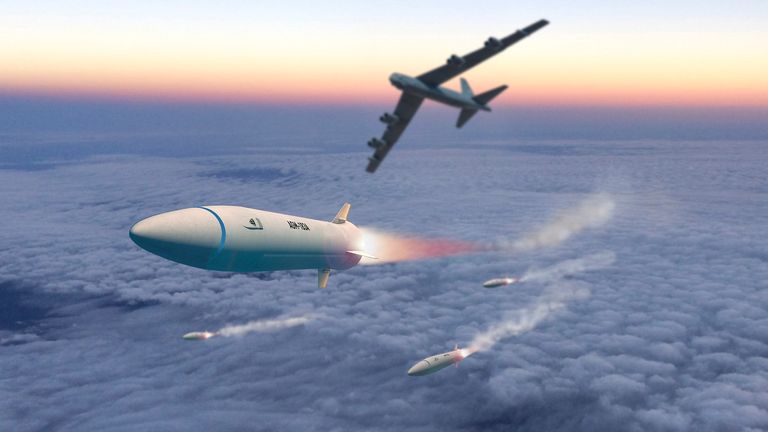The production is slick, the pundits are sharp and the players are gods.
This is no traditional tournament though. This is professional gaming. Fans are watching the best players in the world playing their favourite game, in an arena, for a cash prize.
Around 15,000 fans from across the world are in Birmingham watching pros go head-to-head (virtually) throughout the week, with many thousands more watching the competition online.
The tournament, ESL One Birmingham, is being held at the Resorts World Arena near the city's airport.
While many people will have heard of some of the games that are played at big esports events like this, such as Fifa, the game being played this week in Birmingham will be less widely known.
Dota 2 is described to me by one gaming analyst as being 'kind of like chess' but with flashing lights and novelty characters.
There are two teams of five players and, before play can begin, a considerable amount of time is spent by the professionals choosing their own characters and trying to stop the other team from choosing characters which might be overly advantageous during the game.
Then, frankly, the rules of the game are lost on me but I'm told it involves a king, queens and trying to destroy the enemy's (the other team's) base.
The fans tell me part of the appeal of Dota is how difficult the game is, but ultimately the enjoyment of being a spectator is the same as for sports enthusiasts.
"It's about the professional aspect of it, similar with football. You can go and play football but it's nice to see people playing it at a level you could never play at," says fan Ryan Freeman.

I'm here to watch the competition's semi-final between the UK team, Tundra, and a Saudi Arabian team, Falcons. There aren't actually any UK players in Tundra and Falcons are an equally international bunch.
Much like in professional athletic sports, esports teams are buying and selling the best players in the world. The pros in Tundra and Falcons are some of the best paid in the industry.
One expert tells me at this level, players can make $10,000 (£8,000) a month, plus tournament winnings and sponsorship deals. The prize pot at this competition is $1m (£800,000) although that is shared between the teams, with the winning team taking $300,000 (£240,000).

"I think many people think of the esports team as just five guys who like playing the game at home," says Alvaro Sanchez Velasco, Product Manager at ESL One Birmingham.
"But the [team] organisations have boot camps, they have schedules that include training regimens, psychological visits. They usually have a team manager and team psychologist, that's very common these days, as well as a coach and assistant coach."
Jonas Volek is a Czech professional gamer and although he's not taking part in this tournament in Birmingham, he's here to commentate and analyse the games. While I'm interviewing him I see a line of fans developing, they're clearly waiting for him to finish speaking.

When he does, they all ask for selfies.
Mr Volek, 23, played chess as a child, then switched to video games and by 12 years old he was hooked on Dota 2, becoming a professional player by his late teens. Now he competes in tournaments across the world.
"It's not really a job, it's more of a lifestyle because it takes so much of my time," says Mr Volek.
Read more from Sky News:
Why are thousands of video game workers losing their jobs?
The female gamers competing for thousands of pounds
Fallout: The nuclear-powered game capturing new audiences
"When I'm really training, it takes 12 hours a day, and I'm always travelling. There's no time for anything else."
I didn't see any female players on stage in Birmingham, and the audience is dominated by men.
"I do hope one day I'll see more women up there playing the game in the best teams," says fan Charlotte Keane.
But there isn't the charged, often volatile atmosphere that you might find at many sporting events, particularly men's football.
There is some comic 'smack talk' between players from opposing teams, egged on by the hosts for the audience's enjoyment. But after one player criticises the other player's hair in mock-serious fashion, one of the hosts decides that's enough play fighting.
Of course, for the fans, there isn't the same territorial spirit that comes with supporting a particular football team for instance. Mostly this is about respect for the individual players, who can't hear any of the cheers or chants from the crowd during the game as they wear noise cancelling headphones so they can focus on winning.
Keep up with all the latest news from the UK and around the world by following Sky News
Tap hereAfter about an hour of play, Falcons are victorious, and the fans make their way out of the auditorium to buy hot dogs and fish and chips.
This event feels distinctly less boozy than any sporting competition I've ever been to. But, even for an enthusiast, Dota 2 does not seem like the kind of game it would be easy to follow after a few pints.
Disclaimer: The copyright of this article belongs to the original author. Reposting this article is solely for the purpose of information dissemination and does not constitute any investment advice. If there is any infringement, please contact us immediately. We will make corrections or deletions as necessary. Thank you.



